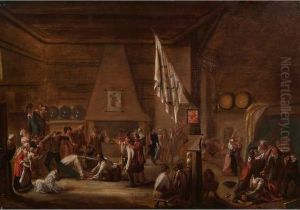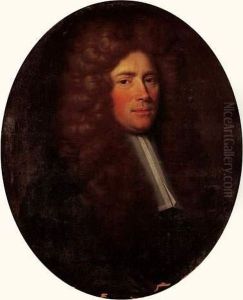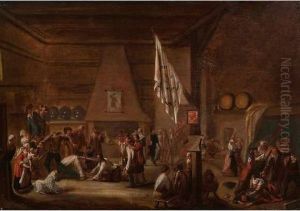Jean-Baptiste Coulom Paintings
Jean-Baptiste Coulom was a French painter, born in 1753 and passed away in 1803. His life spanned a period of significant political and social upheaval in France, marked by the French Revolution and the rise of Napoleon Bonaparte. Despite the tumultuous times, Coulom managed to carve a niche for himself in the art world, primarily focusing on landscape painting, a genre that was gaining popularity during this era.
Coulom's early life is somewhat obscure, but it is known that he was active in Paris and possibly received his training there. The late 18th century was a time when the French art scene was undergoing a transition, moving away from the grand historical and mythological subjects of the Rococo towards Neoclassicism and, eventually, Romanticism. Coulom, however, found his calling in the serene and meticulously detailed observation of nature.
His works are characterized by their attention to detail, soft color palettes, and the tranquil moods they evoke. Coulom's landscapes often depict rural France, capturing the changing skies, the lush greenery, and the daily life of its inhabitants with a gentle realism. This was in contrast to the dramatic and often turbulent landscapes of his contemporaries in the Romantic movement. Coulom's approach to landscape painting was more in line with the ideals of harmony and balance, reflecting perhaps a desire for stability in his own life amidst the chaos of his times.
Unfortunately, like many artists of his period, Jean-Baptiste Coulom did not gain widespread recognition during his lifetime. It was only posthumously that the value of his contributions to French art began to be appreciated. Today, his paintings can be found in various art museums in France, treasured as examples of the quiet but profound beauty of French landscape painting at the turn of the 19th century. Coulom's legacy lies in his ability to capture the essence of French rural life and landscape with a poignancy and realism that continue to resonate with art lovers and historians alike.


